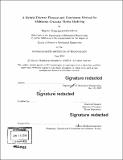A hybrid discrete element and continuum method for multiscale granular media modeling
Author(s)
Chantharayukhonthorn, Maytee.
Download1117714558-MIT.pdf (12.32Mb)
Other Contributors
Massachusetts Institute of Technology. Department of Mechanical Engineering.
Advisor
Kenneth Kamrin.
Terms of use
Metadata
Show full item recordAbstract
Capturing the propagation of microscale physics to macroscale phenomena is intractable for many large systems. Scale propagation is a major issue in granular media, wherein two extremes are often taken. In one, granular materials are modeled as a continuum, which greatly reduces the number of degrees of freedom that describe the system and can thus be simulated relatively quickly. However continuum models are not always precise and have difficulty capturing certain effects such as particle size dependence. In discrete element methods (DEM), every grain and the interactions between them are simulated. DEM is accurate but solve time scales poorly with large grain numbers. Here, we present a hybrid simulation scheme, which seeks a best-of-both-worlds solution by bridging these two approaches. A mass of granular media is partitioned into three domains: a continuum domain represented using the material point method (MPM), discrete grains using DEM, and a transition zone of both MPM and DEM that are coupled via kinematic constraints. An "oracle" determines which areas of the domain are MPM and which are DEM, and converts between the two. In the canonical example of silo flow, flow with a sufficiently small orifice jams, resolving length scale dependent effects. Collapse of granular columns modeled with the hybrid method compare quantitatively well with pure discrete simulation and experiments in literature. A significant speedup is seen with the hybrid method over a similar domain of pure discrete grains.
Description
Thesis: S.M., Massachusetts Institute of Technology, Department of Mechanical Engineering, 2019 Cataloged from PDF version of thesis. Includes bibliographical references (pages 95-98).
Date issued
2019Department
Massachusetts Institute of Technology. Department of Mechanical EngineeringPublisher
Massachusetts Institute of Technology
Keywords
Mechanical Engineering.